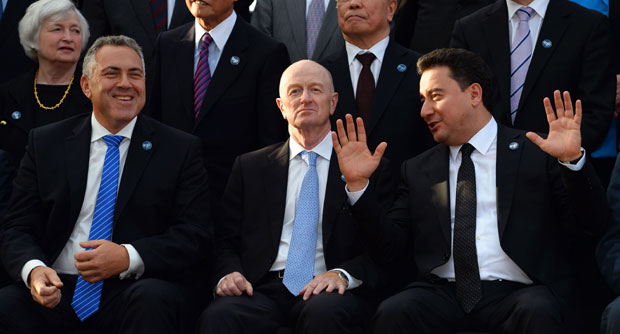G20 players work to nail down growth targets

Turkey’s Finance Minister Ali Babacan (R) chats with Australia’s Reserve Bank Governor Glenn Stevens (C) and Australia’s Treasurer Joe Hockey (L) during the G20 Finance Ministers and Central Bank Governors official group photo, in Sydney on February 22, 2014. The top G20 officials are meeting in Sydney to work out ways to boost growth and create jobs. AFP
SYDNEY – G20 finance ministers and central bank governors Sunday worked to nail down agreements on boosting growth and creating jobs after “excellent” talks on the winding back of US monetary stimulus.
Australian Treasurer Joe Hockey said there was a lot of good will among officials from the world’s most important economies to reach consensus on a raft of issues ahead of the G20 leaders’ summit in Brisbane in November.
Hockey has been pushing ministers to agree to faster global growth targets with private sector investment as a central plank, and a draft of the communique, cited by Bloomberg, said they would agree on “concrete measures” to achieve this.
The draft stated collective gross domestic product could be raised by “at least two percent” above current projections over the next five years, although this could not be confirmed.
Hockey said he did not want to comment on specifics before the talks end later Sunday.
“There is a lot of good will but I don’t want to preempt the discussions,” he said.
Hockey stressed the need for structural reforms to drive growth.
“If we want to have — not just job creation, but job security — then we all have a responsibility to undertake structural reform,” he said.
Ahead of the meeting the IMF said more coordinated work was needed to keep output expanding and boost demand, as the world economy still struggles to leave behind the financial crisis that began in 2008.
Officials in Sydney have been focusing on how to free up labour markets, encourage infrastructure investment and undertake the structural reforms needed to drive domestic demand.
They are also considering the next steps needed to reform the IMF, drawing up a roadmap on financial regulatory reforms and ways to close tax loopholes.
The shockwaves being felt by some emerging economies from the Federal Reserve easing back its mammoth stimulus programme, which has seen a flight of capital and currency volatility, has also been a key area of discussion.
Countries led by Indonesia, South Africa, and Brazil have called on the US to provide more clarity on its wind-back and better communication to subdue the impacts on emerging markets.
Hockey said there had been extensive talks on how communication could be improved.
“We’ve had extensive discussion of the impact of tapering on emerging economies,” he said. “It was an excellent round of discussions.”